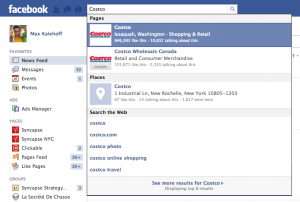 Facebook announced a new beta product called “Graph Search,” which CEO Mark Zuckerberg positioned as a “pillar” alongside Timeline and News Feed. This was a carefully orchestrated announcement with lots of hype and subsequent punditry.
Facebook announced a new beta product called “Graph Search,” which CEO Mark Zuckerberg positioned as a “pillar” alongside Timeline and News Feed. This was a carefully orchestrated announcement with lots of hype and subsequent punditry.
While the announcement focused primarily on features for users, one unanswered question is: What does Facebook Graph Search mean for consumer brand marketers, whom Facebook is working hard to court? Here are some answers to that question, compiled by myself and colleagues from Syncapse.
Graph Search Description
First, Facebook launched a new “Search” function that is different than Google. The big difference is that Facebook is focusing on using “Friends” and their “data” to refine their search. A good way to think about Facebook search is that it allows you to ask your “Friends” a question. For example, what kind of cars do my friends own? Or what hotel should I stay at in New York? Or which of my friends like Costco? This is similar to Siri in terms of approach, but using Facebook friends data.
Graph Search Potential Impact
If Graph Search is successful and catches on, it will affect many things.
First, it will expand the engagement and behavioral lock-in among Facebook users.
It will also connect, surface and create more meaning for the historical Facebook Social Graph database. Today, the value of your Likes and behaviors on Facebook lives in the now. Graph Search would increase relevance for things you’ve done in the past, such as Like a restaurant, attend a concert, or purchase a certain automobile.
It will make Facebook more important for geographically based businesses, by making Facebook relevant at the point of decision and purchase. Think of the local retailers or services businesses for which you normally ask friends for advice. Or once at your local Costco, think of the brands and products for which you seek recommendations.
Graph Search will create even richer Facebook consumer profile data. As Google has proven, search is among the most powerful databases of intentions. It would be quite a feat for Facebook Graph Search to near the success of Google. Nonetheless, a successful search product will enrich Facebook’s already robust database of consumer profiles — adding intention to the existing mix of demographics, interests and social connections.
What Should Marketers Do Right Now?
Brand marketers are still figuring out Facebook — we’re only in the second inning, as one Facebook client partner told me. Yet there’s no question its power and scale has created a marketing platform that is here to stay. Facebook’s ongoing product innovation and experimentation in Graph Search is further evidence of this. Therefore, keep that in mind.
According to Facebook, Graph Search will roll out slowly, as Facebook is experimenting and watching privacy carefully. Therefore, marketers do not need to panic or rush out and act decisively. There is no first mover advantage yet. However, this is a critical time for observing and experimenting. Be sensitive to your early social adopters in your brand’s social graph. Are they adopting this feature? If so, how? That insight should guide marketers’ strategy and investment in this third Facebok pillar.
Second, consumer brand marketers must establish more fluency in search marketing. Being in the business of brand marketing — not direct sales or direct response — brand teams typically have not prioritized search. Social marketing has already called for marketers and their agencies to break down functional silos, as paid, earned and owned media have become inextricably linked. Facebook Graph Search means that marketers not only need to harness social, but search as well. And marketers must coordinate the efforts of both, for they too are now linked in a bigger way.
How are you thinking about Graph Search?
